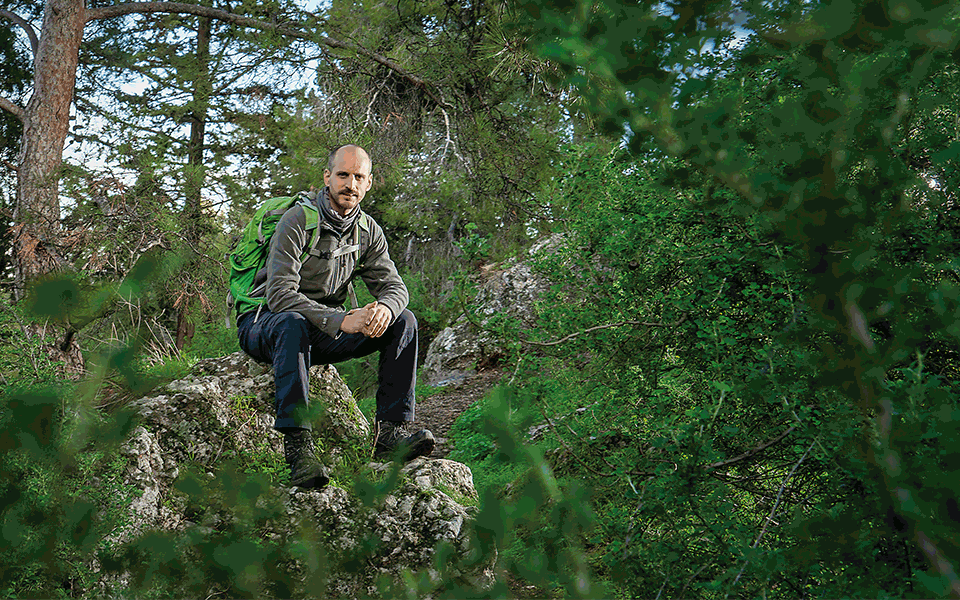Fivos Tsaravopoulos, founder of paths of greece
A decade ago, Fivos Tsaravopoulos decided to go hiking on Kythira, the island of his childhood. Confronted with overgrown and neglected footpaths, he had to find his own way through the undergrowth to discover the hidden beauty of the island. Following this experience, he decided to create a network of footpaths on the island. He traveled widely to acquire the necessary know-how, found funding and worked with locals to establish trails. Over the next five years, Kythira became a destination for hikers.
Tsaravopoulos’ company Paths of Greece has created trail networks from Samos to Prespes totaling more than 630 km in length; a further 500 km are in the process of being realized. One of the latest projects, the Paths of Peace in Florina, traverses a virgin forest to link the villages of Nymfaio and Lechovo; the latter, burnt to the ground by the Nazis, was rebuilt in the postwar period. Today, the opening and signposting of the paths is being financed by the Greek-German Fund of the Future in a gesture of reconciliation. With his hiking trails and as a member of the World Trails Network, Tsaravopoulos has attracted a great new category of nature-loving visitors, who come to Greece in order to walk in its uniquely beautiful landscapes and connect with its nature and civilization. N.D.
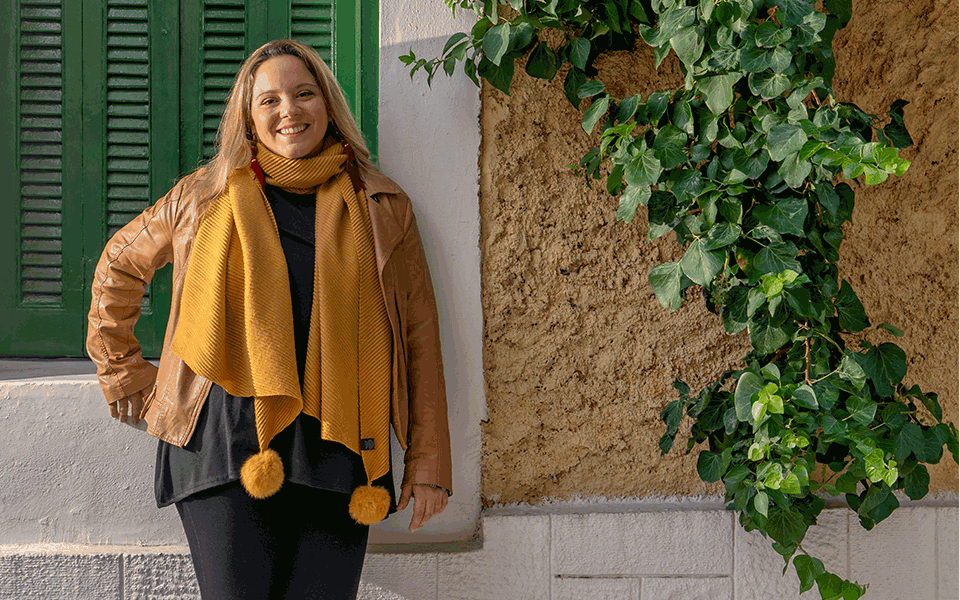
© Perikles Merakos
ELENI FOTIOU, founder of Mamakita.Gr
“Mommy, look” (“Mama, kita,” in Greek) is a phrase that mothers the world over can relate to. So can Eleni Fotiou, mother of three, travel consultant and founder of mamakita.gr, a platform she launched just a year ago to help families from abroad plan their holidays in Greece.
Using the knowledge she has acquired while traveling across the country with her own kids about what places and activities are most suited for families, and drawing on the network of top service providers she has built up, she provides personalized travel planning and tailor-made experiences to anyone seeking genuine adventures, cultural immersion and meaningful connections.
A firm believer in sustainable tourism, she promotes less-visited but equally awe-inspiring destinations, like the Peloponnese, the Diapontia Islands in the Ionian Sea, the Lesser Cyclades and the small islands in the Dodecanese, and so far she’s brought joy to more than a 100 families whose kids never stopped uttering “Mommy, look!” in wonderment. M.C.
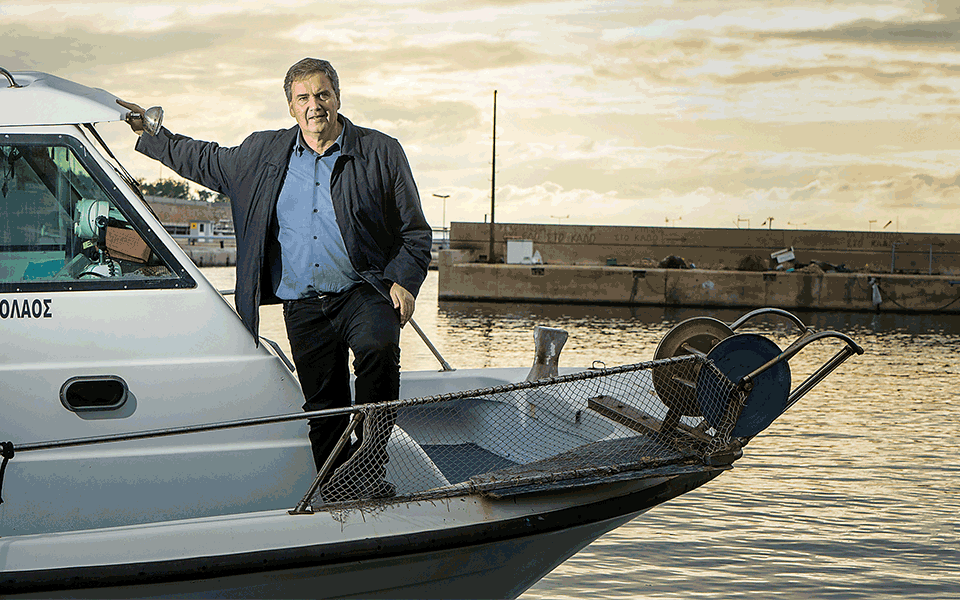
© Perikles Merakos
Giorgos Lourdis, founder of Fishingtrips.gr
Giorgos Lourdis, the son of a fisherman, spent his childhood years on his father’s boat, even though he was not officially allowed to go fishing with him. This was because, until 2015, professional fishing boats were prohibited by law from carrying non-professionals for any reason at all. This is no longer the case, thanks in no small part to Lourdis’ own efforts.
One of the first who pushed for fishing tourism to be legalized in Greece, he also created the fishingtrips.gr website where today fishermen with a fishing tourism license can offer fishing experiences to Greek and foreign tourists. So far, more than 150 fishermen have signed up to the platform, which works in much the same way as Airbnb.
Following a website revamp currently taking place, visitors will be able to book experiences, and read reviews and view photos posted by other users. Lourdis hopes fishermen will embrace the many benefits of fishing tourism: shorter working days, better wages and the chance to let foreign visitors experience a traditional local activity close up, all while easing pressure on fish stocks, too. M.C.
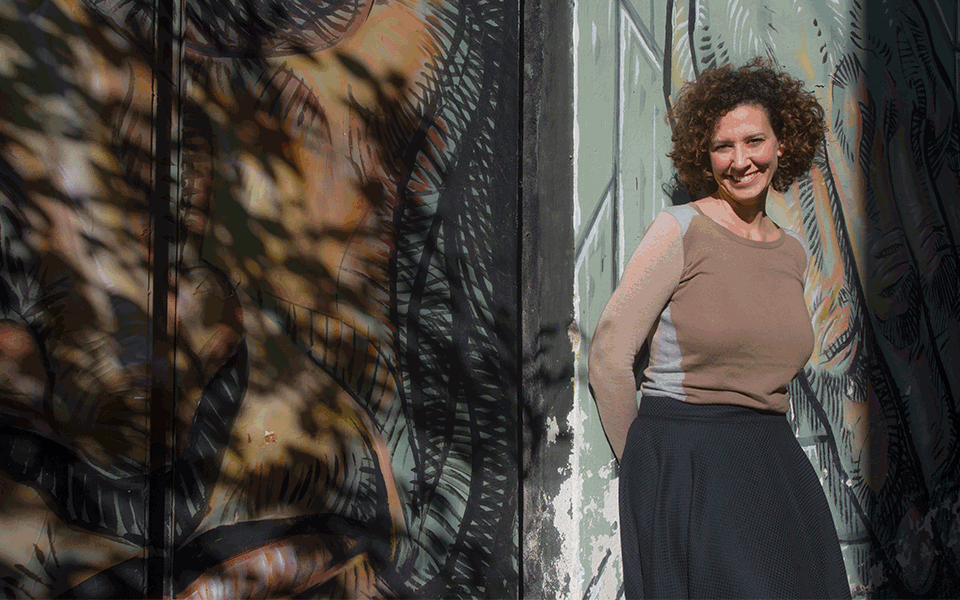
© Clairy Moustafellou
TINA KYRIAKI, founder, Alternative Athens
An avid traveler, Tina Kyriaki always looks for the authentic, finding ways to mingle with the locals, to dine with them and to venture beyond the must-do’s. In 2013, she set up her own company to provide these sorts of experiences for visitors to her native Athens, starting with a food tour. “At the time, hardly any tours here ventured away from the archaeological sites,” she notes.
Visitors loved her new initiative. Today, her company Alternative Athens works with over 60 guides, offering tours on everything from street art to nightlife to mythology; it constantly creates innovative new itineraries, too. The latest challenge is something unique: a tour of the Acropolis for the visually impaired. P.B.K.

© Thalia Galanopoulou
Andreas Kokkinos, founder of “The Shepherd’s Hut” agritourism experience
The reason why the tiny village of Krana, on the slopes of Mt Psiloreitis on Crete is on the tourist map at all, is due to one man: Andreas Kokkinos, a priest and a shepherd. The surrounding area, even though it’s a rural treasure, was long far from the beaten path. Until, that is, Kokkinos, together with his four brothers, built a traditional mitato (a shepherd’s hut) here, erecting it stone by stone.
Today, The Shepherd’s Hut offers authentic agricultural experiences to its day visitors. Kokkinos and his family do exactly what they would be doing as part of their daily routine, but with an audience of 50 on average during the summer, made up of people who come here in order to live like real farmers for a few hours.
Depending on the season, the tasks change: the milking of the farm animals and the traditional cheesemaking takes place throughout the year, but herbs are collected mainly in the spring, the sheep are sheared and the cereal crops harvested in the summer, and in the autumn the Kokkinos family distills the traditional spirit raki, prepares xinohondros (traditional handmade pasta) using fresh milk, and weaves on the loom. A.M.
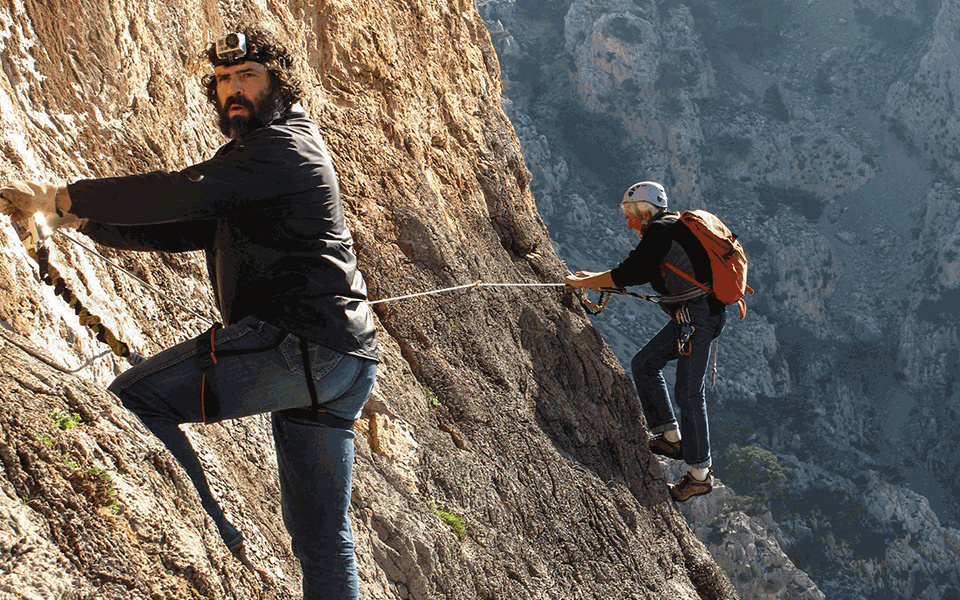
Markos Skordalakis, owner of thalori traditional village
Kapetaniana, in the southern part of the regional unit of Irakleio in Crete, lies on the arid slopes of the Asterousia Mountains. A few years ago, Markos Skordalakis and his wife, Popi, decided to bring this abandoned village back to life; they began buying ruined houses and restoring them. Today, the guesthouse they created has 20 self-contained small houses, all with views of the Libyan Sea.
Skordalakis, who knows the region like the back of his hand, shows his guests around and arranges activities including 4×4 tours, trail hiking, rock climbing and fishing and canoe trips. On any given day, you might find him clambering up craggy rocks atop the precipitous cliffs of the Asterousia Mountains, in pursuit of a glimpse of golden eagles or other wildlife, out riding horses, cooking in the guesthouse’s kitchen or steering his boat along the rugged coastline. Nearly a part of the Cretan landscape himself, he loves introducing his corner of the world to anyone who might be interested in getting to know it. O.C.
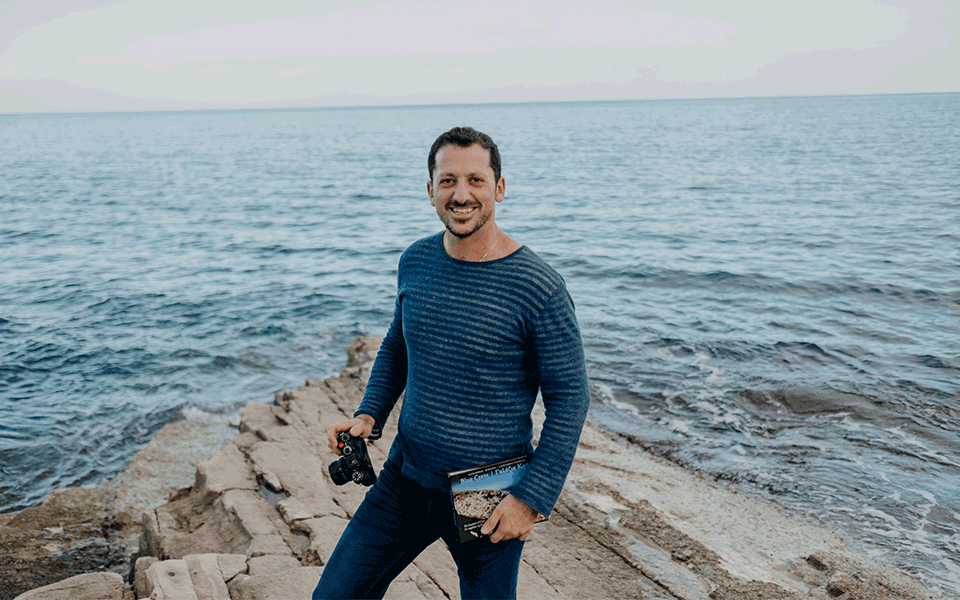
© Christos Manioros
Alexandros Roniotis, founder of cretanbeaches.com
How long does it take to traverse the Lasithi Gorge? Does Lentas Beach in Irakleio have any facilities? Are there any beaches with shade on the southern coast of Rethymno? What myths are associated with Crete? CretanBeaches.com, the project of scientist Alexandros Roniotis, is a website with all the information that a traveler to the island might need.
Ten years ago, Roniotis began to search the internet for information on places he had visited on the island – but without much success. So he started a blog in which he recorded certain details of his visits to various places, and shared his photographs, too. Over time, the blog became a site where, together with collaborators and other travelers, he compiled information on 600 beaches, as well as material on gorges, archaeological sites, footpaths, lakes, rivers and monasteries on Crete.
The platform now attracts thousands of visitors – in summer, it can get as many as 20,000 individual hits per day from people visiting the island. The texts on the site, penned either by him or by other contributors, are factually accurate and do not contain the exaggerations that sometimes come with this genre of writing. Roniotis frequently updates information to reflect changes such as those in environmental conditions. The site features four languages: English, German, Greek and Russian. N.D.
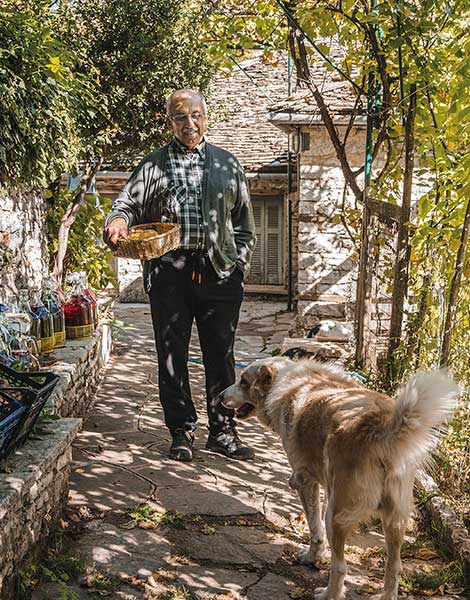
© Alexandros Antoniadis
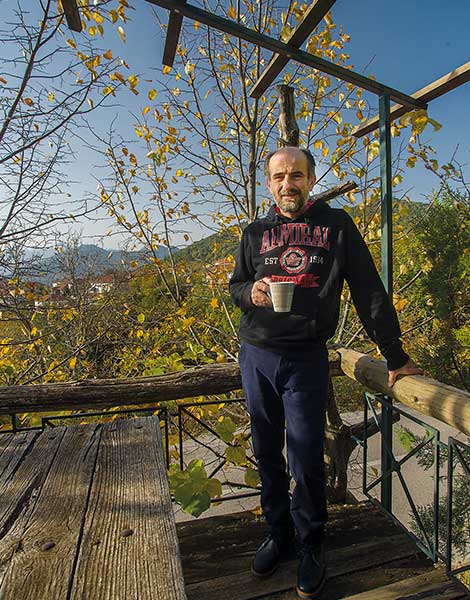
© Clairy Moustafellou
Thoukididis Papageorgiou, owner and operator, thoukididis traditional guesthouse
Born and raised in Kapesovo, a remote village in the Zagoria region of Epirus, Thoukididis Papageorgiou came to know the mountains, the gorges and the footpaths that link the surrounding villages from a very young age. In 1998, his family opened Sterna, a traditional café and pastry shop on the village’s main square. There, the family turned a gamut of seasonal ingredients into finished food products with an admirable sense of home economics: they found a use for almost everything that grew in nature around them, from acorns to forest fruits, natural herbs and wild mushrooms. The village, which then had no more than 20 permanent residents, experienced a renaissance of sorts, largely thanks to Sterna, which became a regional destination of note.
A few years later, Papageorgiou opened the guesthouse Thoukididis, and the convivial hospitality offered by his family now draws additional visitors to the village. In addition, he took it on himself to reopen all the old footpaths around Kapesovo and organized the first mountain running event in the region. A lover of nature and of outdoor activities, Papageorgiou is a staunch advocate of Kapesovo’s potential as a center for organized nature tourism and never misses the chance to point out the wealth of experiences it already has to offer. N.D.
Costas Makkas, owner of makkas hotel
Costas Makkas is the owner and operator of the Makkas Hotel and taverna in Krentis, the last village on the edge of an almost inaccessible mountain region of Evrytania as yet untouched by tourism. Makkas is the man who will welcome you, find you a seat by the blazing fireplace and tell you about the area’s driving routes, hiking trails and scenic spots. He runs a largely self-sufficient operation, which in the past was necessary for all such outposts in remote regions. He keeps livestock and chickens, produces cheese and vegetables and makes his own wine and tsipouro with grapes from his own vineyard.
While the guesthouse may not possess all the most modern comforts, what goes on in the kitchen more than makes up for what might be lacking elsewhere – Makkas is, in addition to everything else, a particularly good cook. His kid goat in red sauce, his traditional meat dish cooked in a clay pot, and his homemade bread all evince a sense of care that is part of the unpretentious hospitality of the countryside. O.C.
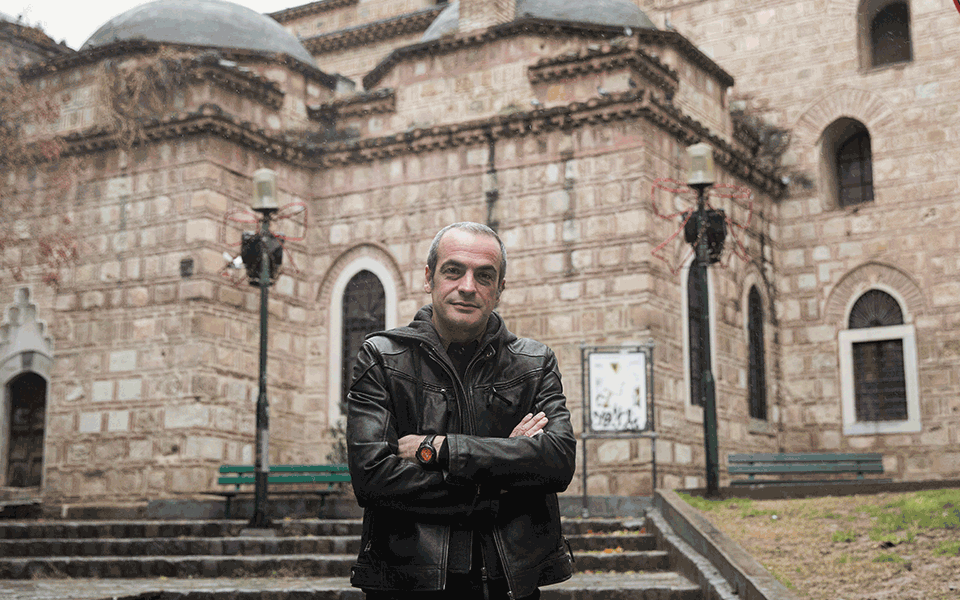
© Konstantinos Tsakalidis
TASOS PAPADOPOULOS, tour guide, Thessaloniki Walking Tours
Having earned his tour guide license in 2014, archaeologist Tasos Papadopoulos could have chosen the well-worn career path of most guides before him, spending all his working hours at the archaeological sites. Instead, he decided he wanted to show visitors more than that. Designing experiences for Thessaloniki Walking Tours, he realized that his other passions, such as rebetiko music and modern history, were interesting to visitors as well.
“People are intrigued by more than just ancient history and Byzantine churches,” he explains, “and there’s something particularly exciting about the dark political stories of modern history, of which Thessaloniki has so many.” Even locals are taking his city tours now; besides archaeology, the walks are focused on themes such as Jewish history, cemeteries and Thessaloniki’s red-light district. His popular “Dark Memories” tour features the true tales of smugglers and murderers – parts of the city’s past normally only talked about in hushed voices. P.B.K.
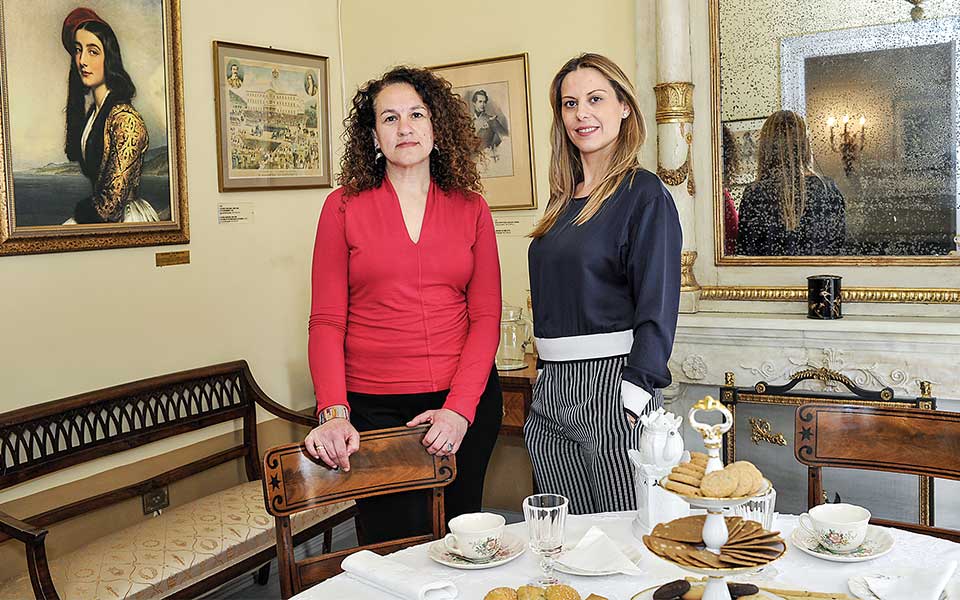
Sophia Antoniadou and Alexandra Tiligada, founders, discover greek culture
What if you could slip into the underground vaults of the Benaki Museum, or hold precious artifacts in your hands, or have dinner in one of the historic private residences of Plaka? In 2013, Sophia Antoniadou and Alexandra Tiligada, the former with a degree in archaeology, the latter in philosophy, were both looking for a new job opportunity when together they came up with the idea for Discover Greek Culture. Today, they offer bespoke cultural tours during which, thanks to contacts at some of Greece’s most famous museums and sites, visitors gain entrance to limited-access spaces for private viewings of treasures not on public display. P.B.K.
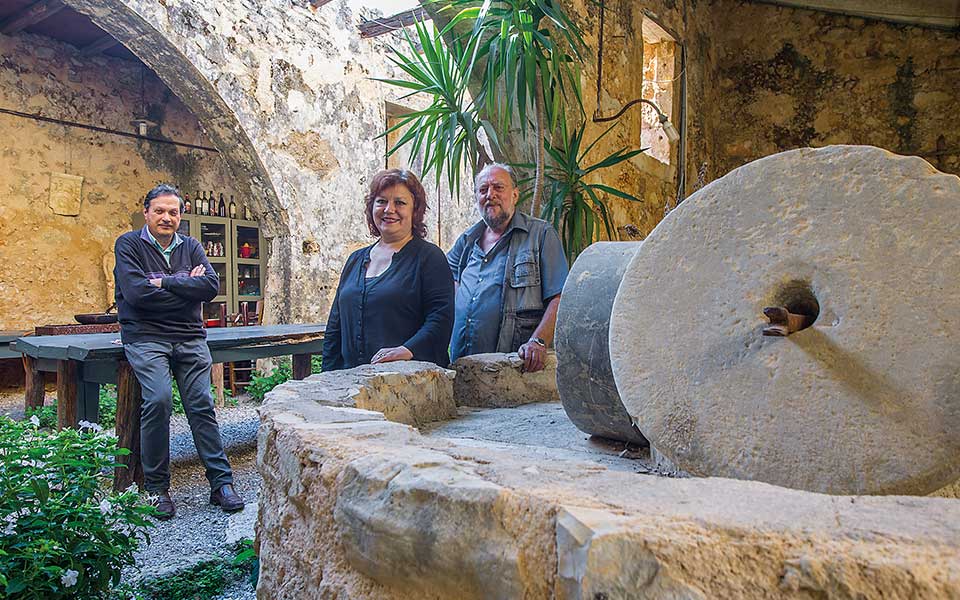
© Clairy Moustafellou
Nikos Frantzeskakis, founder, vamos village
Nikos Frantzeskakis is one of the people who, back in 1994, helped lay the early foundations for agritourism in Greece. Together with his friends, and at a time when no one was discussing sustainable development, and tourism was largely a mass product, he turned the Cretan village of Vamos into an alternative destination. Later, as president of the Hellenic Agrotourism Federation, he rallied this industry sector to successfully lobby for a legal framework for agritourism accommodation and multipurpose farmhouses.
Vamos remains one of the most popular agritourism villages, with guesthouses, a taverna and a tourist office that offers a wide range of activities. With all this to offer, the village has managed to attract not only Greek and international visitors, but new permanent residents as well, who have come from around the world to settle here. O.C.

